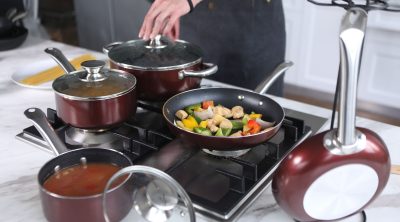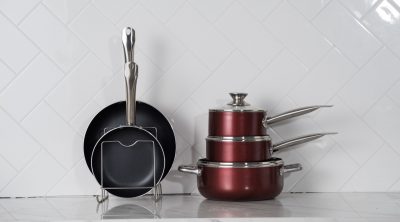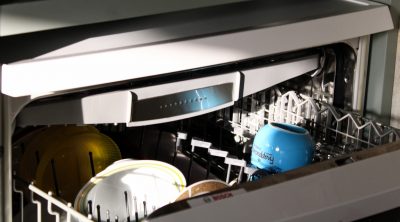Drinking water is an essential part of life. It only makes sense to get the assurance of having clean water in your home, for yourself and your family. That’s where the iSpring and APEC pure water filtration systems come in.
Both are excellent brands of house water filtration systems. You can’t go wrong with choosing either, but let this article enlighten your decision before you commit to either one. Ideally, you only buy one of these to use for a lifetime, or at least for a very long time.
Contents
- APEC vs iSpring: Which one should you get?
- First, what exactly do these water filtration systems do, and why should you get them?
- Why get a reverse osmosis water filter system? What are the benefits?
- APEC Water Systems
- iSpring Water Systems
- The Matchup: APEC Water Systems ROES-50 (5 Stage) vs iSpring RCC7AK (6-Stage)
APEC vs iSpring: Which one should you get?
The APEC ROES-50 is a 5-stage reverse osmosis water filtration system that’s manufactured in the United States. If you’d prefer a tried, tested and certified product from a company trusted by several big-name clients, you will not go wrong with the APEC ROES-50.
The iSpring RCC7AK iSpring RCC7AK is a 6-stage reverse osmosis water filtration system, bringing its 6th-stage of Alkaline Remineralization which restores minerals back to your drinking water. It boasts of its easy installation as well as a better-tasting water product. If you want your water tasty and a little bit healthier, the iSpring RCC7AK is the product to buy.
First, what exactly do these water filtration systems do, and why should you get them?
As evident from the term, water filtration systems filter water like tap water or well water. Apec and iSpring both use Reverse Osmosis in their water filtration systems. Reverse Osmosis is a process of water purification.
How it works is, you take a semipermeable membrane (layers of material that allow only certain things through) that lets only water through. The source water (also known as “feed water”) is then pushed against the membrane with high pressure, allowing the water to pass through, leaving contaminants behind.
As a fun side note, this is one of the most common methods of getting freshwater from saltwater.
As a result of reverse osmosis, two fluids are produced. One is purified water and the other is the wastewater solution (known as brine) which houses all the contaminants filtered out in the reverse osmosis process. This is also why we picked 5-stage minimum filters for this versus match, so we can have the exact power of reverse osmosis.
Typically, reverse osmosis has 5 stages.
- The sediment pre-filter, which essentially blocks out the larger contaminants.
- The carbon pre-filter, which absorbs pollutants. This step removes tastes, odors, and chemicals such as chlorine.
- The semi-permeable membrane. The hero of the reverse osmosis story. This removes up to 98% of the total dissolved solids from the water.
- Storage, which houses the water until full. Once full, a valve closes to prevent more water from coming in. The reverse osmosis process is slow which necessitates having storage.
- Post-filter, in which the freshwater passes through a final carbon filter between the storage tank and the outlet. This is called the polishing filter. As you may have imagined, this will remove any contaminants lucky enough to pass through the whole process.
Now that we’re clear on what reverse osmosis is and how the filtration happens, let’s move on to the why.
Why get a reverse osmosis water filter system? What are the benefits?
- Better taste, purity, and quality of drinking water
- Remove pollutants from water
- Remove chemicals like chlorine, fluoride, and arsenic, which other filter processes typically don’t do.
- Less plastic waste than bottled water. Go green!
Hopefully, we’re clear on the reverse osmosis process front. We can now move on to our contenders.
APEC Water Systems
APEC stands for “Advanced Purification Engineering Corp”. If you go to their website, you’ll see in the title bar “APEC Water Systems – #1 US Manufacturer of Reverse Osmosis Drinking Water Filter Systems”. It may be true, it may be not but this tells us that they’re confident about their company and their products. And they should be!
They boast 20 years of industry experience and a loyal, global customer base. They’re very proud of being one of the last manufacturers whose membranes and primary filters are all manufactured in the United States, which shows you the quality of their materials.
APEC is a forward-looking company aiming to be at the forefront of design and innovation in their field. With big-name clients like Exxon Mobil, Mayo Clinic, Intel Corp, Chevron Oil Company, the US Army, and US Government, well, you can be sure you’re in good hands.
iSpring Water Systems
iSpring Water Systems LLC is our challenger and a family-owned company based in Georgia. They specialize in creating efficient clean water solutions for a variety of residential and commercial needs. Located in Atlanta for nearly two decades, iSpring is made up of a team of water filtration specialists who emphasize quality control and customer satisfaction.
Aiming to provide water filtration solutions for the whole house as well as small businesses, iSpring’s goal is to make clean drinking water accessible and affordable to all consumers while decreasing environmental plastic waste from purchased drinking water.
The Matchup: APEC Water Systems ROES-50 (5 Stage) vs iSpring RCC7AK (6-Stage)
For this matchup, I picked two products with a minimum of 5 stages at around the same price point. On Amazon, the APEC Water Systems ROES-50 was priced at $199.50 at the time of checking, while iSpring’s RCC7AK was at $199.00.
iSpring RCC7AK
The iSpring RCC7AK is certified to NSF/ANSI 58.
What are NSF and ANSI 58?
NSF International is an institute that develops public health standards and certification programs that help protect the world’s food, water, consumer products, and environment. Their standards teams develop these standards, then their services teams test, audit, and certify these standards. If a product has the NSF mark, you can be sure that it passed standards that ensure its positive effect on global human health.
ANSI stands for American National Standards Institute. ANSI oversees the voluntary consensus standards for products, services, processes, systems, and personnel in the United States. ANSI recognizes NSF’s standards, hence NSF/ANSI.
In short, NSF makes the standards, and ANSI oversees those who’ve voluntarily followed these standards.
NSF/ANSI 58 is the specific standard attached to reverse osmosis systems, and iSpring RCC7AK passes these.
The iSpring RCC7AK is a 6-Stage water filtration system.
The iSpring RCC7AK is a 6-Stage water filtration system. Compared to the APEC ROES-50 which has 5 stages, the iSpring RCC7AK has one whole stage as an advantage. What does this extra stage do? In addition to the usual reverse osmosis steps, the iSpring RCC7AK boasts an Alkaline Remineralization stage.
The Alkaline Remineralization stage restores health minerals and produces balanced alkalinity. This added step gives your water a much more natural taste than regular 5 stage reverse osmosis water filters.
The iSpring RCC7AK is easy to install and inspect.
Aside from being designed to be easy to install on your own, there are plenty of resources online, as well as physical instructions provided to easily set up your iSpring RCC7AK. There are consumer reports where they’d praise the iSpring customer support, especially with some in-depth guidance over the phone.
Not only that, iSpring provides lifetime tech support for all products. RCC7AK uses a transparent 1st Stage housing so you can easily, visually inspect the sediment filter and watch the contaminants being removed from your water. You will also know it is time for a filter change before a problem occurs because the visuals can help you foresee this.
The iSpring RCC7AK’s output freshwater is tasty.
Plenty of comments from RCC7AK’s owners, especially those who’ve had experience with 5-stage filters, are very happy with the taste of the water. Even beverages made with the resulting freshwater such as tea or coffee are reported to taste much better.
In conclusion, the iSpring RCC7AK is a nice investment, from the easy installation all the way to the good-tasting, mineral-infused product freshwater.
APEC ROES-50
The APEC ROES-50 is a WQA Certified System.
WQA stands for Water Quality Association. They are the leading voice of the residential, commercial, industrial, and small community water treatment industry. WQA serves as an educator of water treatment professionals, a certifier of water treatment products, and the voice of the water quality improvement industry.
Having the APEC ROES-50 certified by WQA means that a global association recognizes the quality of the product. Note that WQA has certified ROES-50 of NSF/ANSI 58 as well, which I’ve explained in the previous product’s section, as well as NSF/ANSI 372, which certifies that the product is lead-free.
This means that APEC ROES-50 has the advantage when it comes to standard certification, coming in with that NSF/ANSI 372.
The APEC ROES-50 is using a 100% lead-free designer faucet.
Related to the previous point, the APEC ROES-50 uses food-grade tubing and parts to provide safe, contamination-free pure water.
The APEC ROES-50 has a confident warranty period.
All APEC products fall under a two-year extended manufacturer warranty period. This is a definite advantage over the iSpring RCC7AK’s one-year warranty. It shows how confident APEC is with the products they make that they can afford to have it on warranty for an extra year.
The APEC ROES-50 is US-manufactured.
APEC boasts that their products are manufactured in the US. If this matters to you, then this is definitely an advantage to APEC. In comparison, a quick google search will show iSpring was fined for “falsely claiming that wholly imported Chinese water filtration systems were made in the United States.”
For people who do care about where the products are manufactured, claiming that products were manufactured in the US (when they are not) sends the message that the company is not confident about the origin of their products. Specific iSpring products were not named, so perhaps the iSpring RCC7AK was not involved there.
To summarize, APEC ROES-50 is a tried, tested, and certified product, in which the makers are confident with the quality. It is absolutely an excellent investment which is guaranteed to last.
The Verdict
As I was doing research for these brands and products, my preference kept changing. The more I dug into it, the better each of the brands and their products looked. Initially, I was all for APEC's ROES-50 At a glance, it just seemed more reliable than the iSpring RCC7AK.
When I did my research on the iSpring RCC7AK though, its 6th stage Alkaline Remineralization had become so appealing to me that I’d changed my preference to it without even seeing its other features and qualities. It was further reinforced when I read about its ease of installation, especially when I saw the customer reviews.
One of the major factors that affect my decision when buying something is how easy it is to use the product so that definitely appealed to me. Even then, I still felt on the fence about iSpring RCC7AK. When I read about how good the water tasted, I thought that would cement my decision. Some people would think “Does water even have a taste? Does it even matter?” and it really does.
When I did my research on APEC ROES-50, at first I thought “I don’t think I’ll pick this. iSpring RCC7AK’s got an extra stage,” but while iSpring RCC7AK does have an extra feature that ROES-50 does not have, APEC’s ROES-50 more than makes up for it with its certifications.
It not only has the same certification as RCC7AK, but it also has a certification for being lead-free. Both these certifications are WQA certified for ROES-50, something that RCC7AK does not have. It begs the question “if ROES-50 can get certified by WQA, why isn’t RCC7AK?” That got me back on the fence.
The kicker that finally set my decision? When I found the page which said iSpring made false claims about the origin of their products. This made iSpring seem unconfident to me about their product, having claimed that they’re made in the US when they were not. If you want a water filter that does the whole reverse osmosis process and more, go with iSpring RCC7AK. It’s a good buy.
If you want a water filter that does what it needs to do and has the certification and longer warranty to prove its quality, go with APEC ROES-50. It’s the safer bet.
My winner: ROES-50. I’d much rather go with a water filter that I know the makers are confident about (that two years warranty is no joke) than go with a product with the extra bells and whistles that I’m not that confident in.










Leave a Reply